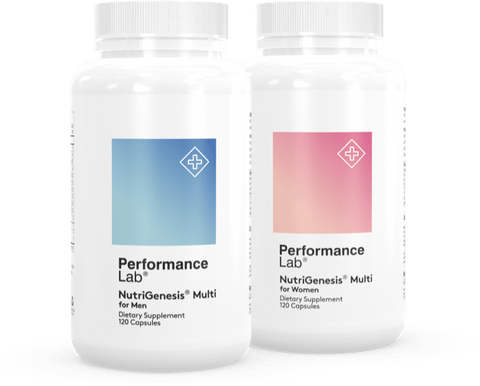If you’ve spent hours watching the time pass or the entire night tossing and turning, you know that getting enough shut-eye isn’t always easy.
While looking at your bedtime habits is an excellent place to start, it’s also worth considering what you are — or aren’t — putting in your body.
Vitamins and minerals profoundly impact your body’s optimal performance, and a deficiency of specific nutrients can severely impair sleep quality. Maintaining a balanced diet and a varied diet, including food sources rich in vitamin B6, helps prevent vitamin deficiency and sleep problems.
Studies show that up to 30% of Americans may have low levels of vitamin B6 in their blood, with up to 13% officially classed as deficient. (1)
While it's always better to gain your nutrients from food, supplementation could be the answer for many people. If you’re taking B6 or unfamiliar with the link between vitamin B6 and sleep, you’re in the right place.
We’ll cover what it is, how it impacts sleep, and how much you need to get the deep, restorative sleep you’re desperately craving.
If you stick around, we’ll also give you our top two supplements to help improve sleep quality and quantity!
(Hint: they're NutriGenesis Multi + Performance Lab Sleep!).
Key Takeaways
- Vitamin B6 (often as P-5-P) helps synthesize neurotransmitters involved in sleep quality and mood.
- B6 alone isn’t a sedative—works best as part of a balanced sleep routine.
- Consistent intake with magnesium, circadian habits, and stress control supports results.
- Check meds and overall B-complex status; avoid mega-doses without guidance.

How Diet and Sleep are Connected

Before we dive into the details of vitamin B6, it’s essential to understand that diet and sleep are intricately connected.
While lifestyle habits like exercise, stress, alcohol, smoking, and the like contribute to sleep patterns, nutrient deficiencies or excesses are also a big part.
Too much of something or not enough of another can increase the risk of developing a sleep disorder like insomnia and sleep apnea, thanks to their role in regulating our circadian rhythm—the 24-hour biorhythms that control our sleep-wake cycle.
When you can leverage a healthy diet and fulfill your nutrient needs, it’s easy to get the sleep you need. And while altering your diet is #1, supplements can also come in handy to fill in the gaps.
What is Vitamin B6?
With that said, let’s turn to vitamin B6, also known as pyridoxine.
B6 is a water-soluble vitamin that is essential to many physiological functions in the body. It benefits brain health, energy metabolism, helps to regulate mood, stress response, and sleep. (2)
In its most active form, known as pyridoxal 5’-phosphate (PLP), vitamin B6 is an essential partner for many enzymes. It is specifically involved in the metabolism of amino acids, which are crucial for various bodily functions.
On top of that, it’s also involved in:
-
The breaking down of glucose to create energy, ensuring a stable energy supply
-
Formation of red blood cells
-
Supporting the body's tissues
-
Protecting against free radicals
-
Neurotransmitter synthesis (serotonin, norepinephrine, epinephrine, and GABA)
-
Immune function (supports the immune system and helps prevent a weakened immune system). (2, 3, 4)
But your body is unable to create its own vitamin B6, so you must gain it through your regular diet or supplementation. And considering it’s involved in more than 100 enzymatic reactions, getting enough is pretty important.
But it’s a delicate balance—too little can lead to symptoms like irritability, emotional disturbances, confusion, sleep disturbances, and even a weakened immune system, while too much can also interfere with sleep. (5, 6)
How Does Vitamin B6 Help Sleep Quality?

Speaking of sleep, it’s time to jump to the topic of this article—the link between B6 and sleep.
Vitamin B6 is involved in many functions essential to optimal physiological performance. Still, a couple of specific mechanisms link B6 and sleep, namely its involvement in neurotransmitter synthesis.
As we mentioned, B6 plays a vital role in synthesizing three key neurotransmitters/hormones in the brain involved in sleep: tryptophan, serotonin, and GABA.
-
Tryptophan is an amino acid that helps to make the 'happy hormone' serotonin, which is then converted into melatonin, the 'sleep hormone'. It is a co-factor in the tryptophan-serotonin pathway, and without sufficient B6 (along with other vitamins), the body struggles to create enough of these important hormones. (7, 8).
-
GABA is another amino acid naturally present in the brain that acts as an inhibitory neurotransmitter to block excitatory impulses in the brain to decrease nervous system activity. GABA is known as the “calming” neurotransmitter and may help to reduce stress, lessen anxiety, relax the brain, and promote a good night's sleep (9).
In simple terms, adequate levels of B6 support the hormones and neurotransmitters needed to reduce brain activity and stimulate sleep. Without sufficient amounts, neurotransmitter synthesis is impaired, leading to disrupted sleep.
The Science on B6 and Sleep Disorders / Sleep Disturbances
There is scientific evidence and clinical trials indicating that vitamin B6 supplementation may help in improving sleep quality, decrease symptoms of sleep disorders and aid restless legs syndrome. (The latter especially when taken with magnesium). (10, 11, 12)
A lack of vitamin B6 has been linked to insomnia and depression. Supplementing with a vitamin B complex, magnesium and melatonin together may benefit insomnia. (13).
But another interesting facet of vitamin B6 and sleep is dreaming recall and lucid dreaming. A small 2002 study looked at the effect of vitamin B6 on dreams and found that it impacted the emotionality, bizarreness, vividness, and color of the dream. (14)
In a more recent 2018 study designed to replicate the previous study, researchers looked at the effects of B6 on dreams and sleep after supplementing with 240 mg of vitamin B6 (pyridoxine hydrochloride) before sleep for five days in a row.
Results showed that vitamin B6 can significantly improve dream recall but didn’t significantly affect dream vividness, or how colorful or bizarre the dreams were, or other sleep related variables. (15)
That said, in a different research group run alongside this one, participants taking a B-complex supplement as opposed to standalone B6 also reported poorer sleep and higher levels of tiredness upon waking, so more research is needed on the effects of B6 on sleep. (16)
Health Benefits of Vitamin B6

Vitamin B6 offers many benefits for overall health, supporting a wide range of bodily functions beyond just sleep. B6 may also be beneficial for:
-
Improving mood
-
Alleviating PMS symptoms
-
Preventing anemia
-
Maintaining healthy blood vessels
-
Supporting brain health
-
Supporting brain function, including neurotransmitter production and potentially reducing memory loss
-
May reduce symptoms of rheumatoid arthritis
-
It may lower blood pressure
-
Relieves morning sickness and nausea (17)
-
Daily supplementation with vitamin B6, folic acid, and vitamin B12 may help reduce the risk of age-related macular degeneration (AMD) (18, 19)
Symptoms of B6 Deficiency
As we said earlier, B6 is an essential nutrient that cannot be produced in the body and must come through your regular diet or supplementation.
Because B6 is so important for the function of the nervous system, a vitamin deficiency can manifest as several symptoms but is most commonly associated with rashes, tiredness, weakened immune function, and cracked lips. (20)
It may also progress to neuropsychiatric disorders, including seizures, migraines, chronic pain, and mood disorders like depression. (21, 22)
True deficiency may also contribute to poor sleep quality. Taking vitamin supplements or a dietary supplement, under the guidance of a healthcare professional, may help address these issues and improve sleep quality.
How Much B6 Do You Need?
According to the National Institute of Health (NIH), daily requirements for vitamin B6 currently sit at 1.3 mg for adults 19-50 years old, 1.7 mg for males over 51 years old, and 1.5 mg for women over 51 years old 10.
However, there is some question over these recommended intakes, as research shows most people gain the recommended intake from their food - and yet almost a quarter of people in the U.S. still have low blood plasma concentrations of B6.
Plasma levels were lower in women than men, and also lower in current smokers, non-Hispanic blacks, underweight people, teenagers and adults aged 21-44. Suggesting the current recommended intakes may not be enough for certain population groups.
Other groups that may be at risk of a B6 deficiency include people with kidney disease or renal failure, people with autoimmune disorders, and people dependent on alcohol. (23)
While vitamin B6 has many benefits, it is important to avoid high doses. Excessive intake can lead to adverse effects, like sensory neuropathy—a form of nerve damage.
The National Institutes of Health recommend a Tolerable Upper Limit of 100mg a day for adults and state anyone taking more than this should be under the care of a doctor. However, in 2023 the European Food Safety Authority revised this - recommending an Upper Limit of 12mg per day per adult. (24)
None of the products we recommend on this page exceed this level.
When to Take B6 for Sleep

If you want to take advantage of vitamin B6 for its influence on sleep patterns, when is the best time to take the vitamin?
There are no hard and fast scientific rules when it comes to taking vitamins, but most experts recommend taking vitamin B6 in the morning - that's because many people find the vitamin stimulating, thanks to its energy boosting abilities.
The good news is that a steady build-up of vitamin B6 in your system should still help you fall asleep regardless of when you take it.
Other people may deliberately choose to take the vitamin at night because of its potential contribution to dream recall and lucid dreaming. (25)
Foods Sources of B6
B6 is widely available in all sorts of food—milk, cheese, salmon, tuna, eggs, beef, chicken liver, etc.
If you do not eat meat, you can still obtain vitamin B6 from other sources such as grains, vegetables, and nuts.
Supplementation offers an alternative route that ensures you’re meeting your needs.
Best Vitamin B6 + Sleep Combo
If you’re wondering where to find the ideal vitamin sleep combo in supplement form, we have the perfect duo to support optimal performance and sleep: Performance Lab NutriGenesis Multi + Performance Lab Sleep.
NutriGenesis Multi is a complex of 17+ essential vitamins and minerals made with naturally occurring co-factors to boost bioavailability and absorption.
It supplies 100% Daily Value of at least 15 required nutrients to help your body thrive, including NutriGenesis vitamin B6 — a nature-identical form of vitamin B6 to offer sleep and metabolic support.
It's an ideal foundational multivitamin on which to build your sleep stack.

Shop Performance Lab® NutriGenesis®
The other half of the duo is Performance Lab Sleep — an ultra-modern natural melatonin sleep supplement designed to help you fall asleep faster and stay asleep longer.
Stacking nature’s most potent sleep-supportive nutrients — natural melatonin from Montmorency cherries, tryptophan, and three forms of magnesium — Sleep supports consistent sleep patterns and promotes nightly renewal for peak next-day performance with no groggy side effects.
As we saw, combining magnesium and B6 can make a powerhouse asset for a good night's sleep.
References
- Yang D, Liu Y, Wang Y, Ma Y, Bai J, Yu C. Association of Serum Vitamin B6 with All-Cause and Cause-Specific Mortality in a Prospective Study. Nutrients. 2021 Aug 27;13(9):2977. doi: 10.3390/nu13092977. PMID: 34578855; PMCID: PMC8472743. https://pubmed.ncbi.nlm.nih.gov/34578855/
- Mooney S, Leuendorf JE, Hendrickson C, Hellmann H. Vitamin B6: a long known compound of surprising complexity. Molecules. 2009;14(1):329-351.
- Stover PJ, Field MS. Vitamin B-6. Adv Nutr. 2015;6(1):132-133.
- Vitamin B6 flies under the radar: Are you getting enough? Harvard Health Publishing, https://www.health.harvard.edu/blog/vitamin-b6-flies-under-the-radar-are-you-getting-enough-202205182744
- Kennedy DO. B Vitamins and the Brain: Mechanisms, Dose and Efficacy--A Review. Nutrients. 2016;8(2):68.
- Aspy DJ, Madden NA, Delfabbro P. Effects of Vitamin B6 (Pyridoxine) and a B Complex Preparation on Dreaming and Sleep. Percept Mot Skills. 2018;125(3):451-462.
- Hvas AM, Juul S, Bech P, Nexø E. Vitamin B6 level is associated with symptoms of depression. Psychother Psychosom. 2004;73(6):340-343.
- Ana Gotter, What Is Tryptophan? Healthline, https://www.healthline.com/health/tryptophan#foods-with-tryptophan
- Gamma-Aminobutyric Acid (GABA), Cleveland Clinic, https://my.clevelandclinic.org/health/articles/22857-gamma-aminobutyric-acid-gaba
- Best vitamins for sleep, Sleep Doctor, https://sleepdoctor.com/pages/sleep-aids/best-vitamins-for-sleep
- Sleep Vitamins, Sleep Foundation https://www.sleepfoundation.org/sleep-aids/vitamins-for-sleep
- Jadidi A, Rezaei Ashtiani A, Khanmohamadi Hezaveh A, Aghaepour SM. Therapeutic effects of magnesium and vitamin B6 in alleviating the symptoms of restless legs syndrome: a randomized controlled clinical trial. BMC Complement Med Ther. 2022 Dec 31;23(1):1. doi: 10.1186/s12906-022-03814-8. PMID: 36587225; PMCID: PMC9804944. https://pmc.ncbi.nlm.nih.gov/articles/PMC9804944/
- Djokic G, Vojvodić P, Korcok D, et al. The Effects of Magnesium - Melatonin - Vit B Complex Supplementation in Treatment of Insomnia. Open Access Maced J Med Sci. 2019;7(18):3101-3105. https://pubmed.ncbi.nlm.nih.gov/31850132/
- Ebben, Matthew & Lequerica, Anthony & Spielman, Arthur. (2002). Effects of Pyridoxine on Dreaming: A Preliminary Study. Perceptual and motor skills. 94. 135-40. 10.2466/PMS.94.1.135-140.
- Want to remember your dreams? Try taking vitamin B6, University of Adelaide, https://www.adelaide.edu.au/news/news99562.html
- Adventure-Heart DJ, Madden NA, Delfabbro P. Effects of Vitamin B6 (Pyridoxine) and a B Complex Preparation on Dreaming and Sleep. Percept Mot Skills. 2018 Jun;125(3):451-462. doi: 10.1177/0031512518770326. Epub 2018 Apr 17. PMID: 29665762.
- Health Benefits of Vitamin B6, WebMD, https://www.webmd.com/diet/health-benefits-vitamin-b6
- Christen WG, Glynn RJ, Chew EY, Albert CM, Manson JE. Folic acid, pyridoxine, and cyanocobalamin combination treatment and age-related macular degeneration in women: the Women's Antioxidant and Folic Acid Cardiovascular Study. Arch Intern Med. 2009 Feb 23;169(4):335-41. doi: 10.1001/archinternmed.2008.574. PMID: 19237716; PMCID: PMC2648137, https://pmc.ncbi.nlm.nih.gov/articles/PMC2648137/
- Merle BMJ, Barthes S, Féart C, Cougnard-Grégoire A, Korobelnik JF, Rougier MB, Delyfer MN, Delcourt C. B Vitamins and Incidence of Advanced Age-Related Macular Degeneration: The Alienor Study. Nutrients. 2022 Jul 8;14(14):2821. doi: 10.3390/nu14142821. PMID: 35889778; PMCID: PMC9318446. https://pmc.ncbi.nlm.nih.gov/articles/PMC9318446/#sec5-nutrients-14-02821
- Marsha McCulloch, MS, RD, 9 Signs and Symptoms of Vitamin B6 Deficiency, Healthline, https://www.healthline.com/nutrition/vitamin-b6-deficiency-symptoms
- Hvas AM, Juul S, Bech P, Nexø E. Vitamin B6 level is associated with symptoms of depression. Psychother Psychosom. 2004;73(6):340-343.
- Ahmad I, Mirza T, Qadeer K, Nazim U, Vaid FH. Vitamin B6: deficiency diseases and methods of analysis. Pak J Pharm Sci. 2013;26(5):1057-1069.
- Vitamin B6, Fact Sheet for Health Professionals, National Institutes of Health, https://ods.od.nih.gov/factsheets/VitaminB6-HealthProfessional/#h2
- Health Risks from Excessive Vitamin B6, NIH B6 Factsheet, https://ods.od.nih.gov/factsheets/VitaminB6-HealthProfessional/#h18
- Jenna Fletcher, Is there a recommended time to take vitamins? Medical News Today, Nov 2023, https://www.medicalnewstoday.com/articles/319556#fat-soluble-vitamins
















